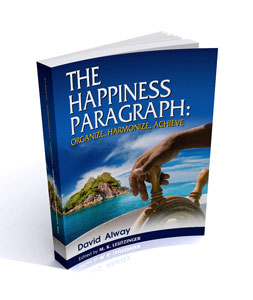The Happiness Project - by Gretchen Rubin
Book Summary:
The Happiness Project by Gretchen Rubin is the personal journey of a writer who decides that she could probably be much happier than she is and so she looks for ways to make this happen. She begins by reading everything she can get her hands on regarding happiness. She reads books on psychology, philosophy, neuroscience, religion, spiritual books and autobiographies. After exposing herself to this information, she decides to put into practice some of what she has read by experimenting on her own life for a year. Each new month of the year she establishes a set of resolutions and she tracks (on a chart) her progress in keeping them (This is The Happiness Project). She ultimately creates a large number of resolutions - often with an overarching theme. To get a flavor, here is a short version of her first three months of resolutions:
January - Boost energy Go to sleep earlier. Exercise better. Toss, restore, organize. Tackle a nagging task. Act more energetic.
February - Remember Love Quit nagging. Don’t expect praise or appreciation. Fight right. No dumping. Give proof of love.
March - Aim Higher
Launch a blog. Enjoy the fun of failure. Ask for help. Work smart. Enjoy now.
For each short phrase above she has a more detailed explanation of what she means.
As each month proceeds, she remarks at what she learns along the way and tries to establish some overarching principles for being happier. Some of her conclusions are:
(1) Growth and striving for something are necessary to improve your happiness.
(2) You are much more likely to succeed when doing something you love.
(3) Challenge and novelty are important to happiness.
(4) Happier people are more psychologically able to risk failure
(5) She can ‘artificially’ elevate her mood by singing and forcing herself to see the positive in things/events.
(6) Money alone cannot buy happiness, but well-directed ‘splurges’ can help.
(7) Both spiritual and material growth are happiness-promoting.
(8) Some activities that are unpleasant in the short-term can still contribute to long-term happiness.
At the end of her book (and after 1 year) she concludes that the whole exercise has indeed made her much happier. She also concludes that everyone should do this same form of experimenting with their lives - creating their own unique ‘Happiness Projects’ to improve their levels of happiness.
Comments and Criticisms:
When I first understood what The Happiness Project was about, I was prepared to hate it. To begin with, it sounded too trivial in its approach. Also - I thought that since it was a very personal and unique journey, that it wouldn’t necessarily apply to anyone else. Ultimately, though, I really enjoyed reading this book! Since I (and likely most others) share the author’s desire to be happier, it was enjoyable to follow this woman’s progress and her ultimate triumph in finding ways to be happier.
Good aspects of the book:
Happiness is important: One of the greatest accomplishments of this book is that it takes the achievement of personal happiness seriously. This makes it clear to the reader by implication that it is ok to pursue your own happiness and that you should read, study, and experiment with life in order to get it.
Fun and experimental: The book has a fun quality. The author reads about an idea, and then applies it to her life. She repeatedly experiments with her life and holds on to those things which seem to work best - discarding or de-emphasizing those which don’t.
Contains good advice: There is a lot of good, if highly distributed, advice and conclusions in the book.
Some shortcomings:
Doesn’t define happiness: I think the author makes a mistake in never trying to define happiness itself. She gives up on this problem very early in the book. This makes it more difficult for her to think abstractly about the subject.
Minimal synthesis of knowledge: The book is proudly eclectic. As a result, though, it lacks a solid base of underlying reasoning and clear advice. The author makes attempts here and there to synthesize her findings - but ultimately doesn’t do this well. In the end, there is an emphasis more on process (doing your own happiness project) rather than on universal findings and recommendations.
Minimal discussion of career and purpose: It is ironic that a book about happiness seems to de-emphasize one of the most important contributors to happiness: finding a major career or purpose that is meaningful to you. This is likely because the author has already switched from a career she didn’t enjoy (law) to one she does (writing). She loves writing and clearly gets a lot of her happiness and pride from doing it. Because this career element is already well-established in her life, it wasn’t noted by her to be missing, and so wasn’t emphasized in the book. The author even notes: “Because work is so crucial to happiness, another person’s happiness project might well focus on choosing the right work.” Furthermore, completing ‘The Happiness Project’ itself is an example of a well-established goal with a built-in time table. It was destined to be both a book and a blog and while she was doing it she knew or suspected that it would contribute to the success of her writing career. The whole endeavor was a high-level achievement which contributed to the author’s happiness - and yet this remains an unremarked on background concept within the book itself.
Conclusion:
I can recommend this book for its fun quality, its taking of personal happiness seriously, and much of the advice contained in it. It is not though a synthesized set of universal ideas regarding how to get happier - but more of an eclectic approach with an emphasis on personal experimentation.
